Lectures by the Venerable Master Hsuan Hua,
Given at Gold Mountain Monastery,
San Francisco, California, in 1974
The Sutra in Forty-two Sections Spoken by the Buddha
Section 17 to 26
--------------------------------------------------------------------
Section 17
When Light Arrives, Darkness Departs
The Buddha said, those who see the Way are like someone holding a torch who enters a dark room, dispelling the darkness so that only light remains. When you study the Way and see the truth, ignorance vanishes and light remains forever."
The seventeenth section reveals that darkness has no independent existence. Since it doesn’t have any independent existence, once it vanishes, it is gone for good. Once you see the Way, then all ignorance will vanish.
The Buddha said, those who see the Way are like someone holding a torch who enters a dark room, dispelling the darkness so that only light remains. A person who sees the Way is like someone who takes up a torch and goes into a dark room, immediately banishing the darkness so that only the light remains. The darkness is gone because he holds a torch. The torch represents our wisdom. This means that if we have wisdom, we can break through ignorance, which is represented by the dark room. If we have wisdom, the dark room will become bright.
When you study the Way and see the truth, ignorance vanishes and light remains forever. Someone who studies the Way and can see the actual truth will immediately vanquish ignorance, and wisdom will remain forever.
----------------------------------------------------------------------
Section 18
Thoughts and So Forth Are Basically Empty
The Buddha said, Dharma is the mindfulness that is both mindfulness and non-mindfulness. It is the practice that is both practice and non-practice. It is words that are words and non-words, and cultivation that is cultivation and non-cultivation. Those who understand are near to it; those who are confused are far away, indeed. It is not accessible by the path of language. It is not hindered by physical objects. If you are off by a hairsbreadth, you will lose it in an instant. "
The eighteenth section explains the relationship between the existence and non-existence of mindfulness and cultivation.
The Buddha said, Dharma is the mindfulness that is both mindfulness and non-mindfulness. "The Buddha said, Dharma is not being mindful that you are mindful; and even the thought of that not being mindful is not there. Therefore my Dharma is called a mindfulness that is mindfulness, and yet not mindfulness. It is the practice that is both practice and non-practice. In my Dharma, practice also is he Way of effortlessness. In cultivating, you don want to have any attachments. It should be the same as not cultivating. Even the shadow of o cultivating should not remain.”
It is words that are words and non-words. Don’t be attached to words and language. Further, even your intention not to be attached to words and language should be done away with. And it is cultivation that is cultivation and non-cultivation. It is the Way of effortlessness, cultivating and yet not cultivating, certifying and yet not certifying. There isn’t any thought of cultivating the Way. That means that you don have any attachments; all attachments are seen as empty. Even the emptiness is emptied out.
Those who understand are near to it. To understand something means to be clear about it. If you understand this doctrine, you are near to the Way. Those who are confused are far away, indeed. But if you fail to understand and are confused about the principle, then you will be far from the Way. What is the Way ultimately like? It tell you: It is not accessible by the path of language. You want to speak about it, but you can represent it in words. You want to think about it, but you can formulate the thought. You simply cannot speak of its wonder. It is said that the path of words and language is cut off, and the place of the mind workings ceases to be. What the mind wants to think about is gone, and absolutely everything is empty. It is not hindered by physical objects. Physical matter is itself the basic substance of True Suchness. If you are able to realize this state, then you will see that the mountains, the rivers, the earth, and all the myriad things are just the basic substance of True Suchness, and you will not be hindered by physical objects. If you are off by a hairsbreadth, if you are off by just a fraction of an inch, just a tiny bit, in the way you cultivate, you will lose it in an instant. You immediately lose it and won be able to find it. You should break through your attachments, and then you will be able to attain this state.
----------------------------------------------------------------
Section 19
Contemplating Both the False and the True
The Buddha said, contemplate heaven and earth, and be mindful of their impermanence. Contemplate the world, and be mindful of its impermanence. Contemplate the efficacious, enlightened nature: it is the Bodhi nature. With this awareness, one quickly attains the Way. "
In the nineteenth section, the Buddha teaches us the principle that everything is made from the mind alone. We must cast aside what is false and keep what is true. Heaven covers us from above, and the earth supports us from below. Seen from the point of view of ordinary people, heaven and earth are eternal and indestructible. But, in fact, they are not eternal and indestructible. They also undergo the superseding of the old by the new. They are not permanent.
The Buddha said, contemplate heaven and earth, and be mindful of their impermanence. "When you look at heaven and earth, you see that sometimes they are hot and sometimes cold. When the cold comes, the warmth goes. There is the cycle of spring, summer, fall, and winter. On the earth the mountains and rivers are involved in constant transition and do not stay fixed. They are dharmas that are created and destroyed. They are not the uncreated, undestroyed dharmas of the mind. They are impermanent. Therefore, the Buddha said to be mindful of their impermanence.
Contemplate the world, and be mindful of its impermanence. The world changes; it is not static. [In Chinese, the two characters for the concept “world " imply the ideas of time and place.] Both time and place are subject to creation and destruction. Neither is permanent and indestructible. So the text says, “mindful of its impermanence." Contemplate the efficacious, enlightened nature: it is the Bodhi nature. You contemplate your own bright, enlightened spiritual nature: it is just the Bodhi-nature. With this awareness, one quickly attains the Way. If you can investigate in this way and gain an understanding, if you can know it as it is, then you will immediately obtain the Way. Because you understand this principle, you will obtain the Way. But if you fail to understand this principle, you will not obtain the Way.
--------------------------------------------------------------------
Section 20
Realize that the Self Is Truly Empty
The Buddha said, you should be mindful of the four elements within the body. Though each has a name, none of them is the self. Since they are not the self, they are like an illusion."
The twentieth section instructs people to contemplate the human body in terms of the four elements, in order to realize that the body is like an illusion, like a transformation. It is false, and unreal.
The Buddha said, you should be mindful of the four elements within the body. "We should consider the four elements within our bodies. Our bodies are a combination of these four: earth, water, fire, and air. The solid parts of the body are from the element earth. The moist parts are of the element water; warmth comes from the element fire; and breathing and movement are manifestations of the air element.
Though each has a name. The four elements all have names. Each element has its own name. None of them is the self. None of them can be called the self. Consider the body and figure it out: the head has the name head " ; the feet have the name feet " ; the eyes have the name eyes " ; the ears have the name ears " ; the nose has the name nose " ; the tongue has the name tongue " ; the mouth has the name mouth. " From head to foot, every part of the body has its own name. Now, where would you say the self can be found? Which place is called the self " ? There isn’t any place called the self. Since there is no place called self, then why do you want to be attached to the self? Why do you want to look upon the self as so important? The entire body contains nothing called the self.
Since they are not the self, they are like an illusion. There is no self, and so the body is like an illusion, like a transformation. There isn’t anything real about it. The one who contemplates and that which is contemplated are both empty and false. Both are illusory, and mere transformations. If you can understand that they are like an illusion, like a transformation, you can understand the doctrine of the contemplation of emptiness, falseness, and the Middle Way. When you understand this principle, you will know that the body is empty, false, and unreal.
------------------------------------------------------------
Section 21
Fame Destroys Life Roots
The Buddha said, here are people who follow emotion and desire and seek to be famous. By the time their reputation is established, they are already dead. Those who are greedy for worldly fame and do not study the Way simply waste their effort and wear themselves out. By way of analogy, although burning incense gives off fragrance, when it has burned down, the remaining embers bring the danger of a fire that can burn one up."
Section Twenty-one teaches that people who seek fame not only don benefit from it, but are actually harmed by it.
The Buddha said, here are people who follow emotion and desire and seek to be famous. People give way to their emotions and desires and chase after fame; they are after a good reputation. By the time their reputation is established, they are already dead. By the time you have made a name for yourself, you are already old; and once you are old, you will soon die. So there no real point to it.
Those who are greedy for worldly fame and do not study the Way simply waste their effort and wear themselves out. People who are greedy for an ordinary, worldly reputation and who don cultivate to attain the fruition of the Way apply their effort in vain. They wear themselves out. By way of analogy, although burning incense gives off fragrance, when it has burned down, the remaining embers bring the danger of a fire that can burn one up. Suppose you light a chunk of incense. Although you can smell a whiff of fragrance, when the incense has burned down, a fire may flare up from the embers and burn you to death. This is a very dangerous consequence that could occur.
-----------------------------------------------------------------
Section 22
Wealth and Sex Cause Suffering
The Buddha said, people are unable to renounce wealth and sex. They are just like a child who cannot resist honey on the blade of a knife. Even though the amount is not even enough for a single meal serving, he will lick it and risk cutting his tongue in the process.
The twenty-second section explains clearly that wealth and sex have little flavor, but cause great harm. So people with wisdom should not be like ignorant children who crave a sweet flavor.
The Buddha said, people are unable to renounce wealth and sex. In this world, there is wealth on the one hand, and sex on the other. These two harm many people who cultivate the Way. If people who cultivate the Way cannot renounce wealth, they will be greedy for it. If they cannot renounce sex, they will be greedy for sex. If you are greedy for wealth and sex, you cannot accomplish your work in the Way. Most people cannot renounce these two. What are they like? The Buddha brings up an analogy. They are just like a child who cannot resist honey on the blade of a knife. Even though the amount is not even enough for a single meal serving, he will lick it and risk cutting his tongue in the process. There a little bit of honey on the sharp edge of the knife, not even enough for one meal serving. Seeing the honey on the blade of the knife, a child licks it. Ignorant people who crave wealth and sex are just like the child who craves the honey on the knife and who thus risks cutting his tongue. Therefore, we must certainly see through and put down wealth and sex. Only then can we obtain self-mastery.
---------------------------------------------------------------
Section 23
A Family Is Worse than a Prison
The Buddha said, people are bound to their families and homes to such an extent that these are worse than a prison. Eventually one is released from prison, but people never think of leaving their families. Don’t they fear the control that emotion, love, and sex have over them? Although they are in a tiger jaws, their hearts are blissfully oblivious. Because they throw themselves into a swamp and drown, they are known as ordinary people. Pass through the gateway! Get out of the defilement and become an Arhat! "
This twenty-third section explains that people are as if smothered by their families and their houses. To be smothered like this is worse than being in jail. People should stay far away from this situation and recognize how dangerous it is.
The Buddha said, people are bound to their families and homes to such an extent that these are worse than a prison. "People are tied up by their families. Houses also bind people. It is said that householders are bound by three kinds of yokes that they wear at all times.
A family is like a wooden cangue locked so tightly around your neck that you can shrug it off. In the past, you had to wear a cangue as punishment if you committed certain crimes. Once you have family, it is just like a cangue locking you up. For instance, some of our laypeople who have families have lost their freedom. They want to go to heaven, but they aren’t free to go. They want to travel around the earth, but they can go. They are locked securely at home. That what it means to be bound up by a spouse so that everything becomes inconvenient. If you have children, it as if you are handcuffed, which makes it inconvenient to move around. Having parents is like having a ball and chain on your foot. These are the three yokes that bind anyone who has a family. To be bound to your house means that you cannot put it down. You are bound up, and it worse than being in a prison. Having a family and a house is just like spending your life in prison.
Eventually one is released from prison. The time will come when your sentence is finished and you get out of prison, but people never think of leaving their families. You don’t want to leave your family. You may think about leaving them, but you really don want to. For example, some of you say you want to leave the home-life. If you want to leave home, then go ahead and leave home. Why simply talk about it? You’re still just talking about it because you haven really made the resolve to leave home. You are just singing a tune.
Don’t they fear the control that emotion, love, and sex have over them? These people have no fear of being controlled by emotion, love, and sex. Although they are in a tiger jaws, their hearts are blissfully oblivious. Even though this situation is like being in the jaws of a tiger, you wouldn’t mind being eaten by the tiger.
Because they throw themselves into a swamp and drown, they are known as ordinary people. Because they cast themselves into a swamp and drown themselves, they are called ordinary people. Pass through the gateway! Get out of the defilement and become an Arhat! What gateway? The gateway of emotion and desire, of love and sex, and of attachments to families and homes. Pass through the gateway and you will get out of the defilement; you’ll become an Arhat who leaves the world of defilement. You will be a sage who is about to attain the fruition of Arhatship.
------------------------------------------------------------
Section 24
Sexual Desire Obstructs the Way
The Buddha said, if all longings and desires, there is none as strong as sex. Sexual desire has no equal. Fortunately, it is one of a kind. If there were something else like it, no one in the entire world would be able to cultivate the Way. "
The twenty-fourth section speaks of people thoughts of sexual desire. If you are able to cut off sexual desire, it will be easy for you to realize the fruition of Arhatship. Unfortunately, it is not at all easy to cut it off. All living beings have this problem. According to the Shurangama Sutra, f you cannot renounce thoughts of sexual desire, you cannot transcend the dust of the world. If you can get rid of sexual desire, then you will not be able to realize Arhatship.
The Buddha said, f all longings and desires, there is none as strong as sex. "Here, longings and desires" refer to sexual desire, that is, to the mind of lust. There is nothing more powerful than attraction to the opposite sex. Sexual desire has no equal. It is so strong that there is nothing more powerful than this kind of emotional desire. Fortunately, it is one of a kind. If there were something else like it, no one in the entire world would be able to cultivate the Way. Luckily, sexual desire is unique. If there were something else equal to it, then none of the living beings in the entire world would be able to cultivate the Way. It is difficult enough with just one obstruction like this; two together would simply devour people, and no one would be able to cultivate. Another illustration of this is when women get confused by desire for women, and when men get confused by desire for men. Men and women both engage in homosexual conduct: men have homosexual relationships with men, and women have homosexual relationships with women. It all amounts to being confused by sexual desire.
----------------------------------------------------------------------
Section 25
The Fire of Desire Burns
The Buddha said, person with love and desire is like one who carries a torch while walking against the wind: he is certain to burn his hand. "
The twenty-fifth section explains why one must stay away from love and desire.
The Buddha said, person with love and desire is like one who carries a torch while walking against the wind. "A person who always indulges in emotional love and desire, who goes along with his emotional desires and lustful thoughts, might as well be holding a burning torch while walking against the wind. He is certain to burn his hand. He is certain to get burned. Now, burning one hand may not be such a great problem, but I afraid he will burn up his entire body. Therefore, in such a situation it better to simply stay away from these things in the first place.
-------------------------------------------------------------
Section 26
Demons from the Heavens Try to Tempt the Buddha
The heaven spirit offered beautiful maidens to the Buddha, hoping to destroy his resolve. The Buddha said, what have you skin-bags full of filth come here for? Go away, I got no use for you. "
Then the heaven spirit became very respectful and asked about the meaning of the Way. The Buddha explained it for him, and he immediately attained the fruition of Srotaapanna.
The heaven spirit referred to here is a demon from the heavens, namely, the Demon King Papiyan. He waited until the Buddha was about to accomplish the Way and then sent a great retinue of demons, a whole army of them, intent upon disturbing the Buddha. But, as the twenty-sixth section explains, the Buddha was not swayed by the demon king. Instead, he was able to convert him into a Dharma-protector of the Buddha.
The heaven spirit offered beautiful maidens to the Buddha, hoping to destroy his resolve. The demon king from the heavens gave three jade women to the Buddha. What is meant by “jade women"? These women were particularly beautiful, as exquisite as jade, with looks that were out of this world. Not only was no one on earth as beautiful, there were no women in the heavens as beautiful, either. The demon king sent the beautiful women, hoping the Buddha would have thoughts of lust. He wanted to destroy the Buddha determination and vows to cultivate the Way.
The Buddha said, what have you skin-bags full of filth come here for? Now, it makes no difference whether you are speaking of men or women, whether it is handsome men or beautiful women. The meaning is not that only women are so terrible, while men are not. The Buddha said the human body is a skin-bag full of filth. Our skin is compared to a leather bag. What stored in the bag? There is little other than excrement and urine inside it. What could possibly be attractive about that?
You may look just on the surface and say, that man is extremely handsome. No matter how handsome he is, he can be more handsome than Ananda, who was so good-looking that Matangi daughter fell in love with him at first sight. When Matangi daughter came before the Buddha, the Buddha asked her what she loved about Ananda. She said, his nose is fine, his eyes are beautiful, his ears are well-shaped, the features on his face are wonderful! "
The Buddha said to her, allright, if you love his nose, I’ll cut off his nose and give it to you. If you love his ears, I’ll slice them off, and you can have them. If you love his eyes, then I’ll gouge them out, and the eyes yours. You can take them back with you. She said, o! That would never do! "
Ultimately, what meaning is there in the love between men and women? No matter how perfect a person may be on the surface, inside there are all kinds of filth. Urine and excrement collect inside, and the nine apertures constantly flow with impurities. Matter comes out from the eyes, wax from the ears, mucus from the nose, and saliva from the mouth. Then there is urine and excrement. Which of these substances is pure and clean? So the Buddha called it a stinking skin-bag full of filth.
Go away, I got no use for you. The Buddha said, you come to give me this? What use is it to me? None! Go away. I don’t want you. "
When the demon offered the women to the Buddha, the Buddha looked at the three women and had this contemplation: hen you’re old, you’ll have who-knows-how-many wrinkles on your faces. And when you’re old enough to have all those ugly wrinkles, your hair will have turned gray, and you won be pretty at all. As soon as the Buddha had this thought, the demon women spontaneously took on that appearance. When they looked at themselves in that state, they felt that it was pretty meaningless, and they were very embarrassed. So the Buddha sent them away, saying, I got no use for you! "
Then the heaven spirit became very respectful and asked about the meaning of the Way. The demon from the heavens then saw what solid resolution the Buddha had for the Way, and so he became even more respectful and asked the Buddha to speak Dharma for him. The Buddha explained it for him, and he immediately attained the fruition of Srotaapanna (the first fruition of Arhatship).
End of Section 17 to 26.
-----------------------------------
Subscribe to:
Post Comments (Atom)











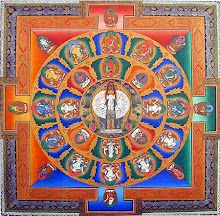




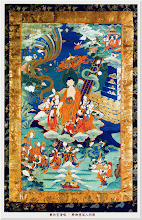

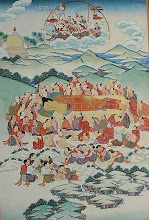


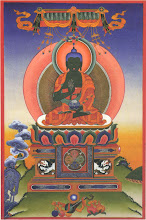




.jpg)

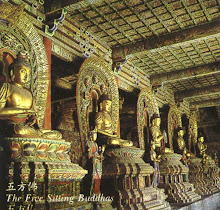













No comments:
Post a Comment